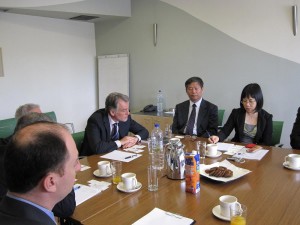The Chinese Academy of Social Sciences (CASS) is the highest academic research organization in its field and a national centre for comprehensive studies in China. It is made up of 31 institutes, which carry out research activities covering about 260 sub-disciplines and has approximately 4000 researchers. On the occasion of a visit of a seven-member delegation of CASS in Greece headed by its Executive Vice-President Professor WANG Weiguang, ELIAMEP organized a round-table discussion on 26 May 2011. During the meeting between the Chinese delegation and ELIAMEP’s reseachers, the need for further research co-operation was stressed in order for both sides to be better informed concerning developments in Greece and China. In parallel with that, the main issues on the agenda were the current situation in Libya and the Greek financial crisis.
As far as the Libya crisis is concerned, members of the CASS delegation concentrated on the extent to which Western allies have transcended the line of the UN mandate by seeking not only to protect civilians but also to topple Muammar el-Qaddafi’s regime. For their part, ELIAMEP’s representatives explained that the Libya case could not be analyzed in isolation but in relation to similar developments in North Africa and the Middle East region. With reference to Mr. Qaddafi they maintained that Europe’s initial hope had been based on a potential regime change ‘from within’. Taken this, the current dilemma Europeans have to face is either to continue and expand their military operation or allow Qaddafi to remain in power, which they consider as rather unacceptable. Furthermore, ELIAMEP’s researchers acknowledged the important role the USA and China can play in the global arena and portrayed the Europeans as unprepared concerning the Arab Spring and its impact. Moreover, both the Greek and the Chinese side focused on the cynicism of foreign policy in the context of humanitarian military operations (“Responsibility to Protect”) and agreed on the necessity for conflicts to be peacefully resolved.
Regarding the Greek crisis, ELIAMEP’s analysts on the one hand criticized past Greek governments for increasing the budget deficit and on the other they concentrated on the policy of markets which continued lending with low interest rates. Looking towards the future they considered the mission of the current Greek government as particularly difficult, as it will have to reduce the budget deficit and create surpluses by applying austerity measures and thus facing public opinion reactions often expressed by demonstrations and strikes. Nevertheless, the current crisis has to be seen as an opportunity for Greece in the long-run as the country could, through the implementation of the necessary reforms, build a healthy basis for its economy. Finally, a new strategy which will get Greece out of the crisis was suggested. An important parameter of this strategy was deemed to be the attraction of foreign investment. In this regard the role of China could not but be of increased significance.




